Te Mana o Ngā Tuna
In 2017, Te Wai Māori Trust established Te Mana o Ngā Tuna to act as a dedicated advisory group to advocate for the protection of Aotearoa’s endemic eel, the long-fin tuna.
This came in response to Te Wai Māori Trust’s 2017 National Tuna Hui, where iwi and hapu shared serious concerns for the health and wellbeing of the longfin tuna. It was clear that unified action was required to address the threats facing tuna. This includes the impact of habitat destruction, degrading water quality, commercial fishing, hydroelectric dams, flood pump stations and introduced exotic fish species.
Since its formation, Te Mana o Ngā Tuna has provided advice to Te Wai Māori Trust in their engagement with central and local government and tautoko iwi, hapū and Māori undertaking mahi to improve the abundance, health and wellbeing of tuna.
Tuna are an important taonga to Māori, their diminishing status undermines the whakapapa of Māori. Te Mana o ngā Tuna work to halt their decline and see them thrive.
Tuna are an important taonga to Māori. Revered for hundreds of years as a source of food, a figure of legend and caretaker of the waterways.
Historic takes of the oldest, largest longfin tuna has had an impact on the species. They’re now classified as declining. While shortfin tuna too are threatened by habitat loss, degrading water quality and fragmentation; the biology, life cycle and habitat preferences of longfin tuna have made them especially vulnerable to change.
The longfin tuna can grow to 1.5 metres long and weigh more than 20kg; the largest – always females, and often over 100 years old – can reach 50kg, making them the biggest and oldest eels in the world. They are endemic to Aotearoa and are only found in our rivers and lakes. Longfin tuna will travel about 4,000km to the deep-sea trenches from which they emerged to spawn, and then die.
Learn more about life cycle of the long-fin tuna from phD student Siobhan Nuri.
Siobhan is a recipient of our Wai Māori Scholarship. In this kōrero at the 2023 Māori Freshwater Fisheries Conference, she shares about how her rangahau (research) on “the mysterious lives of tuna” is looking at providing insights into the poorly understood early life histories of longfin and shortfin tuna in Aotearoa. She focusses specifically on the Rangitāiki River and works in close collaboration with iwi and local communities.
Who are we?
Te Mana o ngā Tuna promote, educate and advocate on behalf of tuna. They provide advice that honour a Māori worldview and acknowledges the interconnectedness health and wellbeing of the forests, taiao, waterways and sea with the wellbeing of people and tuna.
Te Mana o ngā Tuna aim to provide advice on kaupapa that are going to provide the biggest benefit for tuna which has resulted in a focus on critical habitat and critical steps in the life cycle of the tuna. We have collated key resources on this page: relevant research from our partners, tool kits for whānau, hapū and iwi and best practice guidelines for the management of waterways.
For more details on the activities of Te Mana o ngā Tuna, see the strategy and action plan.
Three objectives to support tuna and their well-being
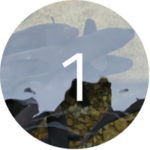
Build and share mātauranga and research on tuna.
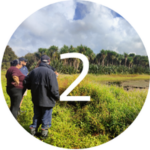
Build strategic relationships with whānau, hapū, iwi and other relevant parties to enhance the health and wellbeing of tuna and its habitat.
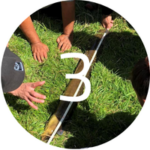
Raise awareness of issues facing tuna and advocate for tuna, whānau, hapū and iwi aspirations.
Current rangahau
Te Mana o Ngā Tuna is supporting Te Wai Māori Trust in two pieces of research. In 2023, Te Wai Māori Trust commissioned research to grow our understanding of pressures like flood pumps, dam barriers and drain clearance and how each impact the ability of tuna to safely migrate up and down rivers to complete their life cycle.
This research with result in ‘best practice’ resources that can be used by whānau, hapū, iwi as well as community groups and local councils to ensure that decisions about flood pumps, dams and drain clearance consider and address the impact on tuna migration.
Currently, there is no best practice for these resource consent decisions and more than that there is a lack of information and understanding about how these practices impact tuna migration. These pieces of research hope to change that.
Video resources
Our roopu members

Erina Watene (Waikato-Tainui, Ngāti Maniapoto, Ngāi Te Rangi)
Co-chair
Erina joined Te Mana o Ngā Tuna in 2017. She is a freshwater scientist with a background in tāonga species research, lake and river restoration, resource management and environmental planning. Erina has led mahi in elver trap and transfer space in Waikato and is experienced in working at the interface between iwi, science and policy. Erina has a strong governance background as a current board member on the Waikato River Authority, Te Wai Maori Trust, and Nga Pae o te Maramatanga, Science Challenge, She also works internationally with current roles/projects in Sweden, Canada, and Australia.

Erina Wehi-Barton (Ngāti Rereahu, Maniapoto, Waikato, Rarua, Tūwharetoa, Te Atiawa)
Co-chair
A member of Te Mana o Ngā Tuna since 2022, Erina is a Kai Rangahau Māori (Researcher) within Te Taiao (Environment) and has spent a number of years establishing Taiao and Hauora initiatives for Whānau, Hāpu and Iwi in Rereahu – Maniapoto, Te Tau Ihu ō te waka ā Maui and across the globe, Erina’s purpose is to assist with advocacy in Te Taiao including Wai- Māori, Taonga species in particular Tuna.

Charlie Bluett (Ngāti Awa)
Charlie Bluett is a founding member of Te Mana o Ngā Tuna. He is the Customary Fisheries Manager for Te Rūnanga ō Ngāti Awa and has a background in Māori Studies, kaitiakitanga and customary fisheries management. Charlie is the mandated iwi representative for the Ministry of Primary Industries Bay of Plenty Regional Iwi Customary Fisheries Forum.
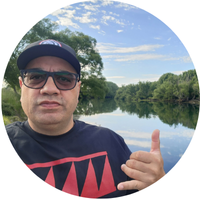
Taroi Rawiri (Waikato, Ngaa Puhi)
Taroi Rawiri has been a member of Te Mana o Ngā Tuna since 2017. He is currently managing director at Kaahu Taiao Ltd and has previously worked as Taiao Manager for Waikato Tainui and as a fisheries officer. Taroi inherited much of his maatauranga from his grandmother Iti Rangihinemutu Rawiri and parents Tom and Keeti Rawiri, he has led significant mahi in the Waikato rohe from commercial eel fishery compliance on the Waikato River, design and implementation of large scale taiao and tuna restoration projects, through to downstream trap and transfer mahi reducing tuna mortalities at flood pumps as they begin their migration home.
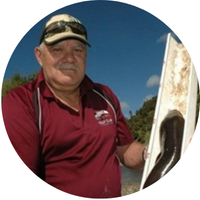
Ben Potaka (Whanganui)
Ben Potaka is a founding member and Chair of Te Mana o Ngā Tuna from 2017 to mid-2024. Ben is well known on the Whanganui River as a leading expert on tuna and piharau, as well as within a regional and national context when it comes to supporting iwi, hapū, whānau customary fisheries management and commercial fisheries sectors.
Raised on the Awa, Ben credits his passion and knowledge as a responsibility passed down to him by his kaumātua and has worked alongside his hapū and other kaitiaki to share and pass on his whakaaro, Whanganui River stories, histories and tikanga.
Ben has been heavily involved in restoration mahi of the awa and was previously Fisheries Manager for Whanganui River Māori Trust Board/Te Whiringa Muka Trust. He was the Inaugural recipient of the National Certificate in Seafood Māori (Customary Fishing) qualification.

Ian Ruru (Te Aitanga ā Māhaki, Ngāti Porou, Ngāi Tai, Te Whakatōhea)
Ian joined Te Mana o Ngā Tuna in 2017. Ian has a scientific background and was an integral part of the development of the Mauri Compass tool that is assisting kaitiaki to restore the mauri of ancestral rivers and the significance of the humble tuna. The Mauri Compass is an innovative environmental tool designed by Te Rūnanga o Tūranganui ā Kiwa and the Gisborne District Council to start conversations about mauri and restoring waterbodies. Ian’s inspiration for developing the tool comes from his father, the late Bill Ruru, and their work together teaching aquaculture and customary fishing qualifications through workshops at 300 marae.
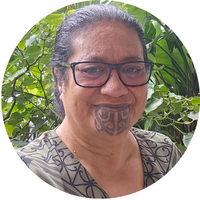
Ngapera Rangiaho (Ngāti Awa, Tūhoe)
Ngapera joined Te Mana o Ngā Tuna in 2022. She is the Chair/Director of Tūhoe Fisheries Quota Limited, and Ngai Tūhoe representative on the Rangitaiki River Forum. Ngapera has worked extensively in the freshwater space with Kokopu Trust and HEPS. Supporting whānau, hapū and community initiatives in our taiao space builds strong relationships. She is currently the Toi-ki-Uta Maori Ward Councillor for Whakatane District Council.


